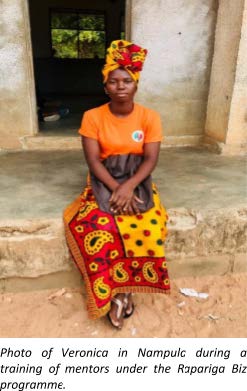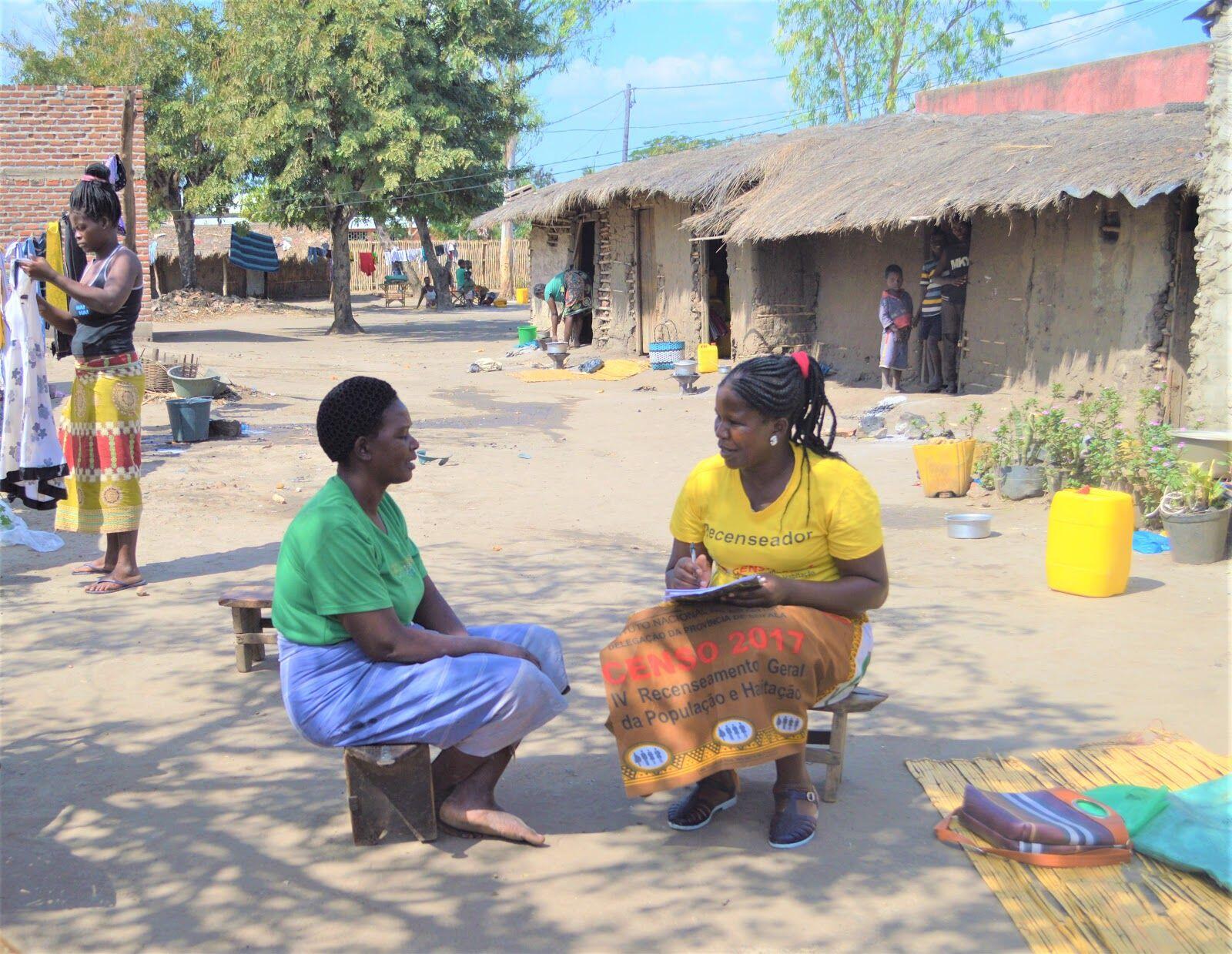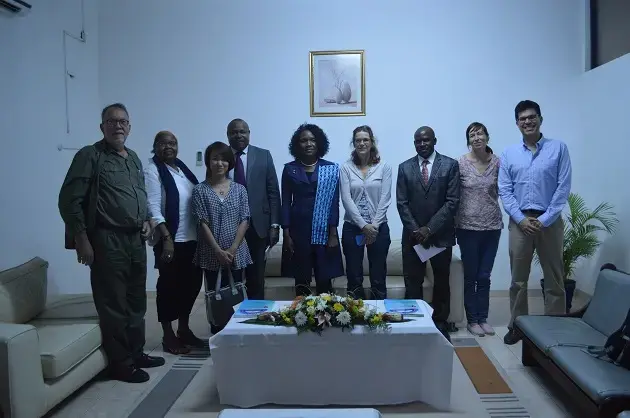By Alessio Cangiano, Technical Advisor, Population & Development, UNFPA Mozambique
Veronica (aged 25), lives in a small locality in the province of Nampula in northeastern Mozambique. At a certain period, her family moved villages and further away from the main town, leaving her no choice but to walk 12 kms to school for five years, often without school supplies and a uniform. At 16, Veronica became pregnant with a man ten years her senior. He left her during her seventh month of pregnancy, leaving her to become a single mother while also trying to finish her studies. Veronica could have suffered complications giving birth which, if left untreated, could have been fatal, or like many girls, once falling pregnant, she could have never returned to school. Eventually, with the support of her parents, Verónica did return to school, finished the 12th grade and now counsels girls on issues related to child marriage and teenage pregnancy under the Government-led Rapariga Biz program.
The 2017 census has shown us that 41% of girls aged 15-17 living in Nampula province have already been married. It has further revealed that maternal mortality has decreased in Mozambique, but still remains high with 452 women dying for every 100,000 live births. The census has also taught us that 79% of the population is less than 35 years old, making the need to analyze demographic and reproductive health trends ever more important. These types of findings from the census data, if properly analysed, disseminated and communicated, can help ensure that girls like Veronica do not travel such long distances to go to school and continue to have the reproductive and maternal health support readily available, regardless of age or location.
The role and importance of the census

The population and housing census is a statistical operation of vital importance to every country. It is the primary source of population data for administration and for many aspects of economic and social development planning. Timely and quality census data are indispensable for informed decision-making, public resource allocation, and better development outcomes. Census data are instrumental in understanding development challenges and the appropriate actions for driving transformations. By reaching out to all households in the country, the census is a unique source of information to map the needs of the most vulnerable and marginalized groups – women and girls, adolescents, older people, persons with disability, migrants, ethnic or religious minorities – with fine geographic granularity. These data are even more important in the face of a pandemic, when the provision of emergency medical facilities requires data on the affected populations.
The population and housing census is a statistical operation of vital importance to every country. It is the primary source of population data for administration and for many aspects of economic and social development planning. Timely and quality census data are indispensable for informed decision-making, public resource allocation, and better development outcomes. Census data are instrumental in understanding development challenges and the appropriate actions for driving transformations. By reaching out to all households in the country, the census is a unique source of information to map the needs of the most vulnerable and marginalized groups – women and girls, adolescents, older people, persons with disability, migrants, ethnic or religious minorities – with fine geographic granularity. These data are even more important in the face of a pandemic, when the provision of emergency medical facilities requires data on the affected populations.
Mozambique’s 2017 Population and Housing Census was successfully enumerated between 1-15 August 2017 with technical and financial assistance from a multi-donor Trust Fund (Canada, Italy, Sweden, Norway, and United Kingdom´s Foreign, Commonwealth and Development Office, FCDO) UNFPA and its partners have worked side by side with the National Statistical Institute (INE) to support all phases of census data production that have led to the publications of the official census results on the 29th of April 2019. The release of the final census results is a major achievement and a significant milestone for a statistical system and a country as a whole.
Rolling out the census - making it accessible to all
However, the census work is not over. The census is not an end in itself, and can only be backed by the value of results if the data are utilized to their full potential. Census data dissemination is a crucial part of the mission of any national statistical office. According to the recommendations of international statistical institutions, the census represents “a valuable public good that should be widely promoted by national statistical/census offices in order to enhance its utilization by the various users [… and] is not complete until the information collected is made available to users in a form suited to their need”
This is perhaps the most fundamental shift in modern population and housing censuses, and more generally in the modernization of statistical systems: the shift from data production to data utilization to inform public knowledge and enhance evidence-based decision making, transparency, and accountability. In other words, statistics are increasingly becoming a fundamental tool for effective governance. It goes without saying that the role of statistical leadership should also adapt and develop to focus more on meeting user needs, and in particular to anticipate new policy questions and ensure relevance of statistics across the data value chain.
The girls and women behind the data
On their own, statistics are just numbers. While some data users, such as researchers and analysts, may have the technical expertise to find and use census tables or information stored in a database, many other potential users of census data do not. This is why effective data dissemination requires presenting data in formats and modes that are relevant to different audiences, take into account their different interests and skills, and provide appropriate guidance. Effectively telling a story with data can help users take informed action. In our high-tech and visual age, maps and data visualizations empower people in understanding a great deal of information at a glance and identify distributions and patterns that are not apparent in other data formats.
If a picture is worth a thousand words, then maps and interactive visualizations can be worth a thousand numbers.
Different means and media of data dissemination all have their advantages and limitations, and are, therefore, complementary.
Through the multi-donor Trust Fund, UNFPA Mozambique continues supporting INE in delivering a fully-fledged census dissemination strategy to engage all types of users. Local-level census dissemination is being conducted to reach out all corners of the country. A set of 17 thematic analyses will be produced to provide in-depth understanding of the causes and effects of demographic trends and socio-economic exclusion. Online data dissemination platforms will cater to users who need flexibility in generating ad-hoc data at any geographical level. Capacity building in statistical literacy is being provided to users who may need to develop a better understanding of the census data. With major ongoing demographic changes and in the middle of a public health and humanitarian crises, all of these activities will contribute to making the content of the census more useful and accessible and to ensuring the inclusion and representation of all Mozambicans.
As the census tracks the rapid growth in a young country like Mozambique, and continues to shed light on the lived realities of Mozambicans, girls like Victoria can be better supported through the availability and accessibility of key social services, ensuring that regardless of geography and income level, she is not left behind.
Her future remains brighter, and all those that follow, because she counts and is counted.



